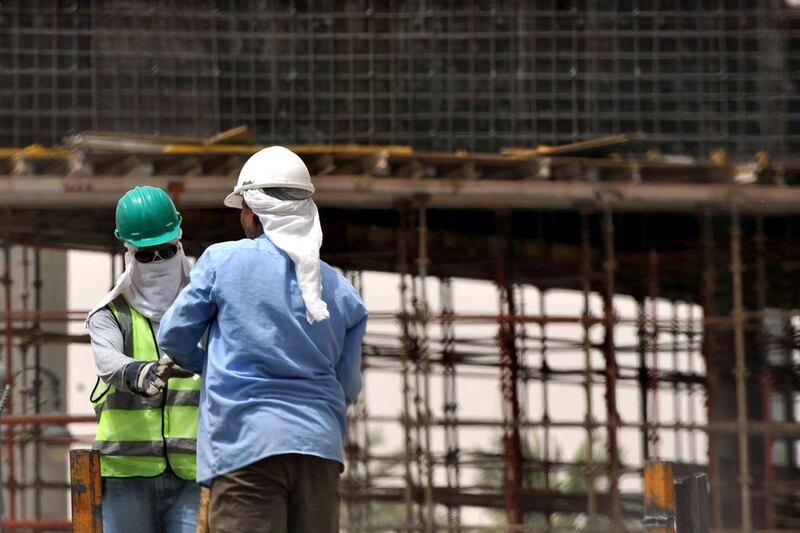Filipino employees of Arabtec Construction in Saudi Arabia have been given financial aid by their government after finding themselves stuck in the kingdom without pay.
The Philippine government’s Overseas Workers Welfare Administration (Owwa) is offering one-off grants to workers who are either still in the country or who have been repatriated to the Philippines without pay or end-of-service benefits.
Among the nine firms listed are Saudi Oger, Saudi Binladin Group and six other contractors – Mohammed Al Mojil Group, M Al Bargash Co; Rajeh Al Marri & Sons; Alumco; Fawzi Saleh-Al Najrani Contracting, and the Real Estate Development & Investment Company – whose employees are being offered assistance.
In its statement, the Owwa said that its relief programme “aims to cushion the impact of forced unemployment/income displacement of OFWs [overseas foreign workers] in Saudi Arabia due to serious financial problems faced by their employers”.
It is issuing grants of 20,000 Philippine pesos (Dh1,560) to workers in camps, or to those who had been repatriated to the Philippines without pay or end-of-service benefits. Grants of 6,000 pesos are also being distributed to the families of stranded workers. None of the nine contracting groups have yet replied to requests for comment from The National.
The Philippine government’s intervention came after the Indian government began distributing food to up to 10,000 workers who are understood to be stranded at camps in Saudi Arabia without any wages. India’s foreign minister Sushma Swaraj pledged on Twitter last Saturday than “no Indian worker rendered unemployed in Saudi Arabia will go without food”.
A minister is also due to visit the kingdom to speak to authorities about the repatriation of workers who cannot afford to fly home.
Saudi Arabia’s contracting firms are suffering from cash flow problems following the government’s decision to halt payments on many government contracts during the third quarter of last year as it prepared its Vision 2030 plan.
Reports in May suggested the kingdom was considering paying contractors with IoUs, and although some cash has filtered through to contractors, payment delays remain.
Fawwaz Al Khodari of contractor Al Khodari & Sons said the government had prioritised payments into four tranches, with payroll commitments to government workers at the top tranche, and payments to contractors in the bottom one.
“The receivables that relate to construction will always get the biggest hit,” he said.
The kingdom's two biggest contracting groups, Saudi Binladin Group (SBG) and Saudi Oger, are among the hardest hit by this. SBG has laid off about 70,000 of its 200,000 workers, and according to Arab News, about 31,000 workers at Saudi Oger – both Saudis and expats – have now lodged complaints about delayed salaries with the kingdom's labour ministry.
Mohammed Al Mojil Group’s problems, however, have been much longer running and stem from an ill-fated move into engineering, procurement and construction (EPC) contracting work in 2010, when it agreed to a string of loss-making deals. The company, which has attempted several restructuring strategies with lenders since its shares were suspended from the Saudi stock exchange four years ago, declared a net loss of 42 million riyals (Dh41.1m) for the second quarter of 2016 on Sunday, bringing its accumulated losses to more than 3.6 billion riyals.
In June 2016, the Committee for the Resolution of Securities Disputes – part of Saudi Arabia’s Capital Market Authority – handed five-year prison sentences to company founder Mohammad Al Mojil and his son, Adel, for manipulation and fraud offences stemming back to the company’s stock market listing in 2008. The company’s remaining board resigned en masse following the sentencing, which the Al Mojil family has argued was based on “fundamentally flawed evidence”.
This week, the Al Mojil family issued a statement blaming unnamed foreign EPC contractors who, it said, were “enjoying favouritism and protection [at] the expense of their local subcontractors”.
mfahy@thenational.ae
Follow The National's Business section on Twitter






